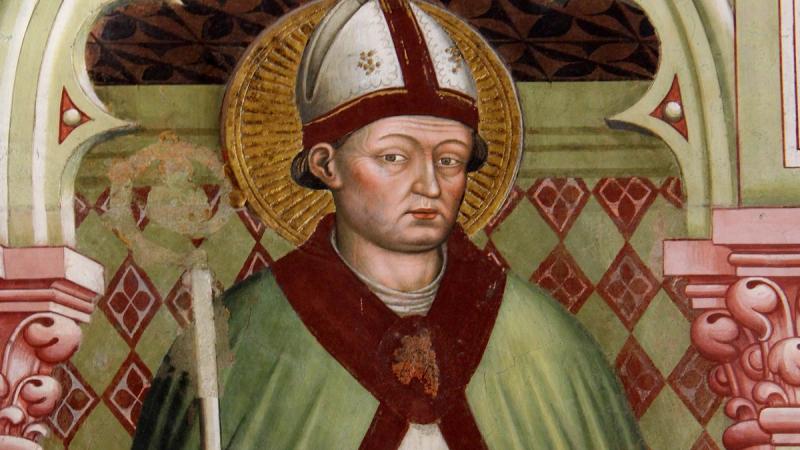It is often said that the turn to the subject occurred with Descartes’s ponderous musing on his existence. And despite his intentions to ground knowledge in a firmer foundation, Descartes’s move from “I think therefore I am” to the existence of God resulted in, through the twists of intellectual history, the popular dislocation of the self from God and the world. However, what Descartes ‘discovered’ was not the self purely but the autonomous self, unanchored by providence and adrift in oceans of monologues. There is another concept of the self, one that finds purpose and significance not in a story of its own making but within the broader scope of the ongoing epic of reality. This is the image of the self that is portrayed by Augustine over a millennium before Descartes thought himself from the brink of non-existence. In some sense, Augustine knew this pull into non-existence (sin), but he understood that the answer comes from another: “Our heart is unquiet until it rests in you.”[1] Humanity is in a state of restlessness kicking against the goads of the goodness of creation and its Creator as it persists in the corruption and rebellion of Adam. For Augustine, it is only in the gracious embrace of this Creator that peace can be restored, and the wellbeing of humanity experienced in its fullness.
Augustine situated humanity’s struggle to find peace and purpose in this world within the sweeping drama of a cosmic story. His own conversion and journey from sin to God is, in some sense, portrayed as a microcosm of this story as well as an instantiation of the story of every believer. The state of humanity is one of disquiet and unrest continually striving for something, or anything, yet without the comfort and purpose for which it was made. For Augustine, the human enters into this world in both a state of unrest and by the overarching plan of God. This is clearly set forth in his discussion of infants in The Confessions Book I.6–7. From their earliest days, the infants are cared for by the mercies of God’s plan, and yet these infants are just as caught up in the unrest of humanity as a whole: “no one is free from sin in your sight, not even an infant whose span of earthly life is but a single day” (I.7.11). Augustine understands the source of this restlessness comes not from some natural inclination of man to seek and journey for truth, as many moderns would presume, but rather from the action of the father of the human race, Adam. For in Adam all have sinned and taken part in the primordial rebellion of mankind (V.9.16; IX.13.34). In speaking of creation in the final book of The Confessions Augustine states,
All these things of your making are lovely, and lo, you who made them are more lovely still, unutterably more. If Adam had not fallen away from you, that briny sea would not have gushed from him, the deeply curious and stormily swollen and unstable flux that is the human race.
XIII.20.28
Humanity is born into this “unstable flux” and continues to perpetuate the gushing of the briny sea as further sins compound and exacerbate the plight and disarray of the human condition.
Augustine’s narrative of his own sojourn in this state of disarray in Books I–VIII of The Confessions was, as he puts it, an attempt “to give a coherent account of my disintegrated self, for when I turned away from you, the one God, and pursued a multitude of things, I went to pieces” (II.1.1.). None will satisfy the deepest need of humanity to find purpose and peace but the one God, the maker of heaven and earth, and seeking that security and wholeness elsewhere further leads to the “disintegrated self.” Humanity in its sin is pulled between the inward knowledge of the Creator and the outward pursuit of the creature. The only remedy for this condition is to heed the call of the fount of life and the great counselor of salvation. As Augustine puts it in a moment of profound praise, “But lo!, Here you are; you rescue us from our wretched meanderings and establish us on your way; you console us and bid us, ‘Run: I will carry you, I will lead you and I will bring you home’” (VI.16.26).
Human life in sin is on a journey down the broad path that leads away from God where the appetites of sin and intellectual pride lead one to and fro in an unending quest for security. There is another path. But to look upon it without the support of grace and the Redeemer can only lead to despair and futility, as it does for Augustine before his conversion (see, e.g., VII.5.12). One with purely intellectual knowledge of the Christian faith and simple assent to the propositions of doctrine cannot tread this path, for this would be an undertaking too much for them to bear. At this point in his narrative, Augustine has left behind the wiles of the Manicheans and the philosophy of Neo-Platonists, but he still finds no help down the path of righteousness, still being bound to the lust of the flesh. More was needed. As the above quotation shows, the Christian is called both to run and to be carried. This is the profound mystery that Augustine will further establish in his debates with Pelagius; humanity’s salvation is from God alone. He gives faith and motivates the will to turn to him; he will carry us and bring us home under his own power, and yet we are to run. This is the great mystery of the sovereignty of God and the responsibility and dignity of humanity.
The disorder of sin causes this disorder in ourselves, and it takes the Creators action to reorder and establish us on the path of Jesus Christ. It is this reordering of expectation that prepares the way for Augustine’s conversion in Book VIII. His soul was prepared to go beyond mere knowledge: “What I now longed for was not greater certainty about you, but a more steadfast abiding in you” (VIII.1.1). In the garden the Lord takes this final action to bring Augustine to himself through the unassuming words of a child, “tolle, lege, tolle, lege” (VIII.11.29). This leads him to the words of Paul in Romans 13:34 where he read “put on the Lord Jesus Christ.” It is this movement of God that restores the order of Augustine’s life and brings him to understand his need and the path that will restore him: a new self now integrated by God though Christ.
After his conversion and baptism, we see the beginnings of Augustine’s reordering around the will of God, which undoubtedly was a continual process for the remainder of this life. At Ostia, as he and Monica are gifted with a greater understanding of God and the truth, Augustine poetically observes, “If all fell silent, we would hear the greatest of truths; the truth cannot be merely known but must be indwelt: ‘We did not make ourselves; he made us who abides for ever’” (IX.10.25). For Augustine, this truth is the most foundational for understanding the answer to the disordered nature of the human self. There is a deep longing and unrest that has been caused in Adam, whose rebellion shattered the perfect union of creation and cast all humanity into sin and rebellion. As humanity lives in this state of sin they stumble and grope for meaning and purpose outside of the Creator, which further “disintegrates” the self as it meanders down the broad path. It is only through coming to abide in Christ the sole mediator between God and humanity through grace that rest can once again be found. This leads us to the Church and to the path of righteousness on which we are to run and be carried at the same time. However, the pureness of rest will not be found fully in this life but must await the eternal rest of resurrection and new creation (see IX.10.25; XIII. 36.51). At this time, the story will be completed, and clarity will be gained. We will know more fully the great truth that “at an earlier stage we [humanity] had been impelled to wrongdoing and abandoned you; but you O God undivided and good, have never ceased to act well” (XIII.38.53). It is within the larger story of the fall of humanity and God’s actions to restore them to himself that each individual story must take place and self-knowledge be found.
Dr. KJ Drake is Sessional Assistant Professor of History at Redeemer University in Ancaster, ON. He is the author of The Flesh of the Word: The extra Calvinisticum from Zwingli to Early Orthodoxy (Oxford University Press, Forthcoming March 2021).
[1] Augustine, Saint, Bishop of Hippo. The Confessions: with an introduction and contemporary; translated by Maria Boulding O.S.B., edited by David V. Meconi S.J. (San Francisco: Ignatius Press, 2012) I.1.1.




